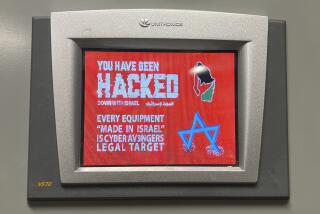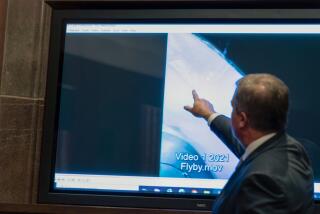Pope calls for united diplomacy
Pope Benedict XVI on Friday called for collective diplomacy, and not “the decisions of a few,” to resolve conflicts and said human rights had to be based on “unchanging justice” and not the legal whims of the day.
Going before a special session of the United Nations, the pope also made a plea for religious freedom as a universal right.
Benedict flew to New York early Friday after wrapping up three days of meetings, Masses and speeches in Washington, in which the recurring theme was the church crisis brought on by pedophile priests.
Later Friday he chalked up a bit of history, making only the third visit by a pope to a synagogue, and the first outside Europe.
“This momentous occasion,” Rabbi Arthur Schneier of the Park East Synagogue said in welcoming the pope, “is a reaffirmation of your outreach, goodwill and commitment to enhancing Jewish-Catholic relations.”
At the U.N., normally formal diplomats and bureaucrats snapped pictures of the pope with their cellphone cameras and jostled to get close as he moved through the institution’s corridors.
Praising the founding principles of the U.N., Benedict said the world body should and does serve as an “active example” of how conflicts can be resolved based on shared regulations and values.
“This is all the more necessary,” he said, when multilateralism is in crisis “because it is still subordinated to the decisions of a few, whereas the world’s problems call for interventions in the form of collective action by the international community.”
“What is needed,” he added, “is a deeper search for ways of pre-empting and managing conflicts by exploring every possible diplomatic avenue, and giving attention and encouragement to even the faintest sign of dialogue or desire for reconciliation.”
Benedict did not single out countries or governments for specific criticism, but the Vatican frequently laments the stunted development of African countries and other poor places while the planet’s wealth concentrates in a few powerful nations. And some in the audience heard a rebuke of U.S. policy.
“I couldn’t help thinking he was talking about Iraq,” said Heraldo Munoz, Chile’s ambassador to the U.N., who helped organize the Security Council’s resistance to the Bush administration’s push to invade Iraq in 2003. The Vatican opposed the war.
“But he was also saying that if you want to tackle global warming, do it through the U.N. and not by going outside it,” Munoz added. “It was an argument on behalf of the U.N. and multilateralism for some member states who have a tendency to work outside the rules.”
The downy-haired pope was clad all in white, except for his custom-cobbled pointed red shoes peeking out from under his robes. More than 1,000 diplomats rose and applauded as he walked to the podium, and again as he departed, both arms raised in a gesture of benediction.
U.N. Secretary-General Ban Ki-moon introduced the pope to the world body, a secular institution of 192 member nations that is “home to men and women of faith around the world.”
Like the Vatican, the U.N.’s mission is to fight poverty, make peace, halt the spread of nuclear weapons and to stop those with greater power from violating others’ rights, Ban said.
“Your Holiness, in so many ways, our mission unites us with yours,” he said.
The pope said human rights “at all times and for all peoples” had to be “principally rooted in unchanging justice,” which he asserts as a product of religious belief.
“The victims of hardship and despair, whose human dignity is violated with impunity, become easy prey to the call to violence, and they can then become violators of peace,” he said.
By contrast, the safeguarding of human rights promotes the “conversion of heart, which then leads to a commitment to resist violence, terrorism and war,” the pope said.
Benedict, invoking a favorite theme, added that one of the most basic human rights is the right to religious freedom. The U.N., he said, has a role in protecting that right, especially when it is seen as clashing with secular ideology or a majority, rival religion.
“It is inconceivable, then, that believers should have to suppress a part of themselves -- their faith -- in order to be active citizens,” he said. “It should never be necessary to deny God in order to enjoy one’s rights.” Members of the audience included diplomats from countries like China, where some aspects of the open practice of Christianity are restricted.
Later, at the 118-year-old Park East Synagogue, an elegant building of arabesque arches and stained-glass windows, the pope delivered Passover greetings and observed the unveiling of a magnificent sparkling torah from behind a blue-velvet curtain.
Benedict also met with a group of Jewish leaders in Washington, as he clearly attempts to foster good relations with the older faith. The German-born pope served in the army of Nazi Germany as a young conscript, but eventually deserted. He visited the synagogue of Cologne, Germany, in 2005.
Some Jewish leaders were recently unhappy with the pope’s decision to liberalize use of an old Latin Mass that includes a Good Friday prayer for the conversion of Jews, and the pope alluded to the issue in the Washington meeting, according to a participant.
“He didn’t clarify it to the extent some people would want, but that will have to be over time,” said the participant, Rabbi Gary Greenebaum, national director of interreligious affairs for the American Jewish Committee. “It was all very symbolic in its way, but symbolism is important in religious exchange.”
The Park East Synagogue encounter centered more on ceremony.
A children’s choir sung “Peace Be Upon You” in Hebrew and the pope and the rabbi exchanged gifts (a parchment from the Vatican library for the rabbi; for the pope, a large silver Seder plate and a box of matzo).
Benedict greeted, shook hands and posed for photos with prominent members of the community, including Ronald Lauder, president of the World Jewish Congress, and former New York Mayor Ed Koch.
On his way out, the pope paused and walked over to the children in the choir, shaking their hands and thanking them for the lovely music.
Later, one of the young boys, in a large white yarmulke, ran up to his father, saying: “He touched me! He touched me!”
--
maggie.farley@latimes.com
--
Wilkinson reported from New York and Farley from the United Nations. Times staff writer Rebecca Trounson in Washington contributed to this report.
More to Read
Start your day right
Sign up for Essential California for news, features and recommendations from the L.A. Times and beyond in your inbox six days a week.
You may occasionally receive promotional content from the Los Angeles Times.







